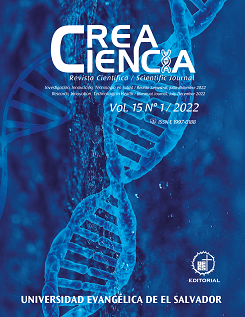Bioethics in transplantation and organ donation in El Salvador
DOI:
https://doi.org/10.5377/creaciencia.v15i1.15714Keywords:
bioethics, donation, El Salvador, transplantAbstract
Throughout history there have been codes to regulate human behavior. Currently, the area of medicine is one of the sciences that has and uses a greater number of codes of ethics. The beginning of the era of organ and tissue donation and transplantation has not been the exception. This era began in the middle of the last century and has been advancing rapidly;
however, it has not been exempt from being regulated by different legal and bioethical aspects. This essay covers the fundamental bioethical principles, such as autonomy, beneficence, non-maleficence and justice, around the donation and transplantation of organs and tissues in the context of El Salvador. Transplants have been performed in the country for 35 years, however, the current law only allows organ donation from living donors. With the new transplant law, bioethical principles will have to be reconsidered, so that the program is accepted by Salvadoran society. There are many challenges to meet from the bioethical point of view, so it is necessary to take examples of practices from other countries to adapt them to the current context of Salvadoran society.
Downloads
1034
pdf 158
Downloads
Published
How to Cite
Issue
Section
License

This work is licensed under a Creative Commons Attribution-NoDerivatives 4.0 International License.
© Crea Ciencia
Declaration of originality and assignment of rights
The article must be sent with a declaration of originality, responsibility and assignment of rights of copy of the manuscript, scanned and signed by the author or by one of the authors when the authorship is collective (designated author), stating that the text has not previously published in printed or electronic format, which will not be presented to any other media before knowing the decision of the journal Crea Ciencia and that, if accepted for publication, the authors transfer the copyrights in all forms and media known. At the end of six months of the publication, the text can be shared in another magazine citing the first version of the article published in Crea Ciencia and recording its number and volume. If the article is not published, the UEES agrees to return the rights enunciated to their authors.

Crea Ciencia articles are published in open access and licensed under a Creative Commons Attribution-NonCommercial 4.0 International License.

